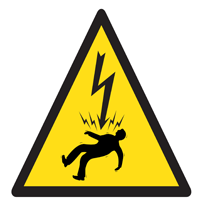Electrical Injuries in the Workplace
December 27, 2017 In its annual “Injury Facts” report, the National Safety Council (NSC) determined that thousands of workers sustained injuries due to electrical hazards in the workplace and another 141 died. Employers need to take preventive steps to ensure that workers are protected from these lethal hazards, as well as to limit the number of workplace injuries that occur.
In its annual “Injury Facts” report, the National Safety Council (NSC) determined that thousands of workers sustained injuries due to electrical hazards in the workplace and another 141 died. Employers need to take preventive steps to ensure that workers are protected from these lethal hazards, as well as to limit the number of workplace injuries that occur.
Even the Occupational Safety and Health Administration (OSHA) reports that employers and employees alike tend to “overlook” the dangers of electricity in the workplace. The Canadian Center for Occupational Health and Safety (CCOHS) finds that workers often fall prey to one of four different types of electrical-related injuries, which are:
- Electrocution
- Burns
- Electric shock, and:
- Falls that are the result of contact with electrical energy
Anytime that a person comes into contact with an electrical energy source, the real risk of electrocution is present. As a general rule of thumb, electricity will always try to find the easiest, fastest path to travel. Human beings have bodies that are conductive for electrical currents, which means that if the electricity is unable to find an easier path to travel it will instead go right through them. When this happens, serious and fatal injuries occur.
According to CCOHS, some of the most common situations that cause injuries in workers from electrical exposure are when they come into direct contact with exposed energy conductors or circuit parts. The center also notes that many workers have been injured or died after being electrocuted and then falling while working on scaffolding, aerial work buckets or ladders.
In order to help prevent the number of fatal and disability-causing electrical injuries that occur in workplaces across the country, OSHA has plenty of helpful tips for employers as well as employees. Although it is advisable for everyone to take precautions, obey rules and try to stay safe in the workplace, it is the legal responsibility of all employers to keep their employees safe and guard against known hazards, such as exposure to electricity.
Some of OSHA’s safety tips for avoiding injuries and death from electrical exposure are:
- Don’t ever touch overhead power lines that have fallen – instead, call the utility company and file a report;
- ALWAYS assume that overhead wires are “live”, and don’t ever assume that any type of wire – regardless of what it looks like or how insulated it is – is safe to touch;
- If you are working or cleaning around overhead wires, maintain a safe distance (at least 10 feet);
- For individuals working at elevated heights (e.g. scaffolding, cranes, forklifts, etc.), make sure you inspect the surrounding area for overhead wires;
- Do not repair any electrical lines unless authorized and qualified to do so;
- If you are driving a vehicle and an electrical line or wire falls on it, stay inside the car or truck and keep driving away from the area. No matter what, stay in the vehicle until emergency services and the local electric utility company have arrived on scene. Do NOT touch any of the wires;
- Ensure that licensed, qualified electricians install and repair all electrical equipment;
- If you work in damp conditions, inspect all electrical equipment and use ground-fault circuit interrupters, also known as GFCIs, and:
- Always exercise extreme caution and attentiveness around electricity
Electrical safety is no joke, and workers can be vulnerable to all different types of injuries as a consequence of exposure. The CCOHS finds that workers are most often injured or killed when they experience “startle reactions” – also known as muscle contractions – and fall from equipment or elevated heights. Serious injuries and fatalities also happen when individuals sustain thermal or contact burns (these can cause internal burns and damage to the organs). Lastly, arc blasts are extremely dangerous to workers; they are a type of electrical explosion that result in pressure waves being released. Sometimes the pressure waves can collapse a person’s lungs, damage their hearing and inflict other life-threatening injuries.
Guarding against known electrical hazards and being extremely cautious when working around live electricity are two good ways to limit the number of incidents that occur. Even though it is the legal responsibility of employers to protect employees from known workplace hazards, failures that put workers’ lives at risk happen all the time. If you or a loved one has experienced any type of injury from electrical exposure in the workplace, please contact a representative at our firm who may be able to help.
Philadelphia Workers’ Compensation Lawyers at Galfand Berger, LLP Represent Individuals Injured at Work
If you were injured at work due to an electrical hazard, please contact Galfand Berger to speak to one of our Workers’ Compensation lawyers in Philadelphia. Our offices are located in Philadelphia, Bethlehem, Lancaster, and Reading, and we serve clients throughout Pennsylvania and New Jersey. To schedule a consultation, call us at 800-222-8792 or complete our online contact form.
 Google Screened
Google Screened
